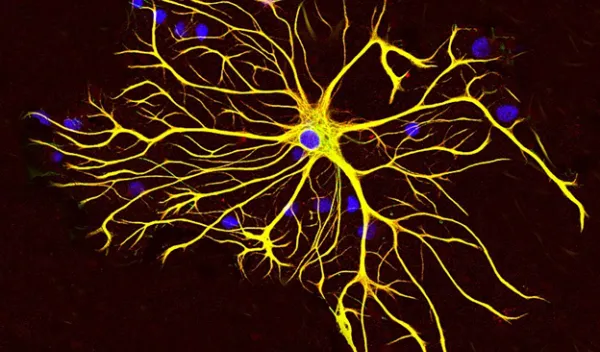
Overwhelmed? Your astrocytes can help with that
A brimming inbox on Monday morning sets your head spinning. You take a moment to breathe, and your mind clears enough to survey the emails one by one.
That calming effect occurs thanks to a newly discovered brain circuit involving a lesser-known type of brain cell, the astrocyte. According to U.S. National Science Foundation-supported research from University of California San Francisco, astrocytes tune into and moderate the chatter between overactive neurons.
This new brain circuit, described in Nature Neuroscience, plays a role in modulating attention and perception, and may hold a key in treating attention disorders, such as ADHD, that are neither well understood nor well treated despite an abundance of research on the role of neurons.
Scientists found that noradrenaline, a neurotransmitter that can be thought of as adrenaline for the brain, sends one chemical message to neurons to be more alert, while sending another to astrocytes to quiet down the overactive neurons.
"When you're startled or overwhelmed, there's so much activity going on in your brain that you can't take in any more information," said Kira Poskanzer, a biochemist and senior author of the study.
Until this study, it was assumed that brain activity just quieted down with time as the amount of noradrenaline in the brain dissipated. "We've shown that, in fact, it's astrocytes pulling the handbrake and driving the brain to a more relaxed state," Poskanzer said.
Astrocytes are star-shaped cells woven between the brain's neurons in a grid-like pattern. Their many star arms connect a single astrocyte to thousands of synapses, which are the connections between neurons. This arrangement positions astrocytes to eavesdrop on neurons and regulate their signals.
These cells have traditionally been thought of as simple support cells for neurons, but new research in the last decade shows that astrocytes respond to a variety of neurotransmitters and may have pivotal roles in neurologic conditions like Alzheimer's disease.
Michael Reitman, first author of the paper, wanted to know whether astrocyte activity could explain how the brain recovers from a burst of noradrenaline. "It seemed like there was a central piece missing in the explanation of how our brains recover from that acute stress," said Reitman. "There are these other cells right nearby which are sensitive to noradrenaline and might help coordinate what the neurons around them are doing."
The team focused on understanding perception, or how the brain processes sensory experiences, which can be quite different depending on what state a person (or any other animal) is in at the time.
For example, if you hear thunder while cozying up indoors, the sound may seem relaxing, and your brain may even tune it out. But if you hear the same sound out on a hike, your brain may become more alert and focused on safety.
The researchers suspect that astrocytes may play a similar role for other neurotransmitters in the brain, since being able to transition smoothly from one brain state to another is essential for survival.
